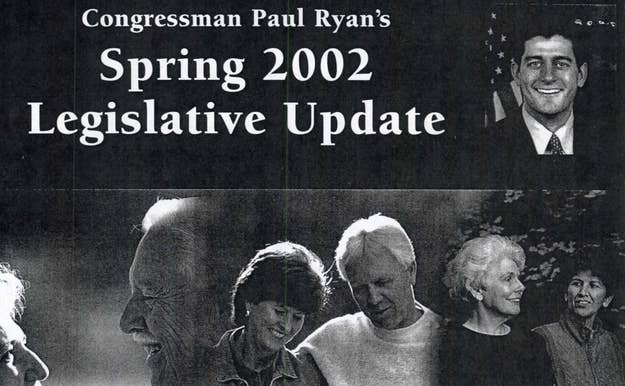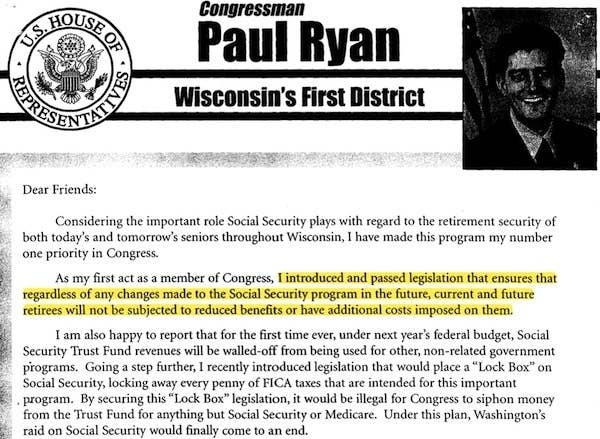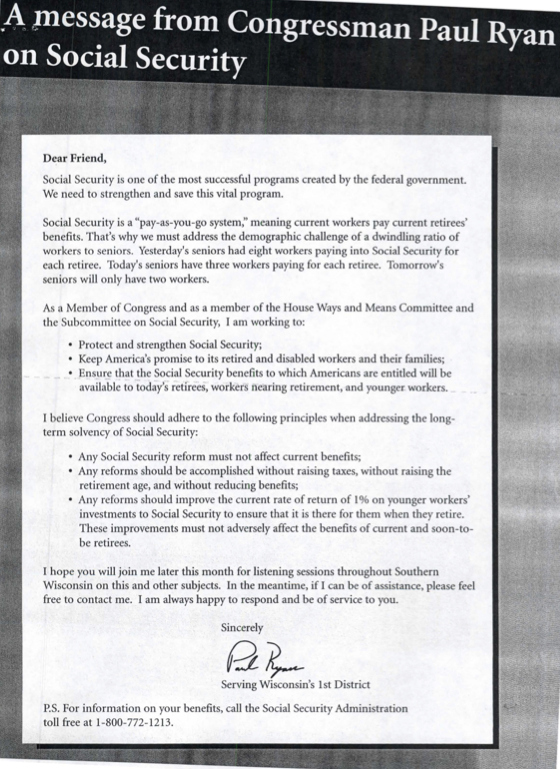
WASHINGTON, D.C. — Paul Ryan’s position on Social Security has changed dramatically since he entered Congress in 1998, taking him from pledges to protect the program’s “Lock Box” and to forswear cuts even for younger workers to a plan to invest retirement funds in the stock market — and back.
He has also pledged repeatedly not to support raising the retirement age, a key element of the Romney-Ryan campaign’s current outline.
As his party’s Vice Presidential nominee, Ryan is now taking great pains to avoid discussing the details of Social Security reform. The Romney-Ryan campaign plan to preserve the program runs a spare 207 words. (President Obama’s is just 37 words long.) And in his most recent budget, he side-stepped some of his most dramatic and politically problematic proposals to overhaul a program that has provided many older Americans money to live on since the New Deal.
But review by Buzzfeed of Ryan’s official mailings to his constituents during his career — which are publicly available in the House — makes clear that Social Security reform has been one of Ryan’s top priorities since he was first elected to Congress in 1998 — so much so that he made the topic his first pieces of major legislation. And those documents and statements by Ryan and his team since joining Mitt Romney’s presidential ticket show that his views have zigged and zagged significantly over time, and that Ryan has contradicted several earlier promises to constituents.
Asked repeatedly why Ryan has abandoned his detailed proposals for Romney’s outlines, Ryan campaign spokesman Brendan Buck refused to answer, saying only that “We’re focused on the Romney-Ryan plan to save Social Security – no changes for those in or near retirement and gradual reforms for future generations. As opposed to the super-secret plan the President won’t reveal.”
Ryan hasn’t always been so shy when it comes to Social Security.
He began considering the issue shortly after his election to Congress in 1998. In a 1999 letter to constituents, Ryan boasted that he “recently introduced legislation that would place a “Lock Box” on Social Security, locking away every penny of [Social Security] taxes that are intended for this important program."

Then, in a 2002 newsletter to voters in his Wisconsin district, Ryan said that any changes to the entitlement program must “ensure that the Social Security benefits to which Americans are entitled will be available to today’s retirees, workers nearing retirement, and younger workers” and that “any reforms should be accomplished without raising taxes, without raising the retirement age and without reducing benefits.”
But by 2004, Ryan’s positions were clearly beginning to change. In an annual newsletter to constituents that year, Ryan’s position now included support for investments of Social Security money, foreshadowing George W. Bush’s failed push to privatize elements of the program the following year.
“There are two options: 1) have the federal government invest Social Security in the stock market, or 2) have young workers invest some of their own taxes in accredited investments of their choice. I support the second option,” Ryan wrotes.
But even then Ryan was clearly opposed to some features now under consideration, repeating again that he would only support reforms that “do not raise the retirement age.”
Since then, Ryan has made several ideological leaps, first to the more fully evolved near privatization of the program in 2005 then to a modified plan debuted 2008.
That plan was something of a hybrid, in that it allowed for private investment accounts so long as they were overseen by Personal Social Security Savings Board — a government run panel tasked with running the personal savings account program.
That plan helped launch Ryan into the upper echelons of the conservative movement and put Ryan in a rare class of politicians – because whether you saw his plan as “bold” or “radical” the fact that he was willing to firmly grip the ultimate political “third-rail” set him apart from most lawmakers.
Although he did not disavow that plan after Republicans took control of the House, he did not include it in either of his last two budget plans, whose most dramatic changes are to the massive federal health care programs.
Ryan’s selection as Mitt Romney’s running mate marked the most recent shift in his position. Pivoting away from his own 400-plus page reform plan, Ryan has embraced Romney’s vague outline that would gradually raise the retirement age while curtailing the growth of benefits for higher income workers — both of which contradict his previous pledges to constituents.
At the same time, it appears that Romney and Ryan have abandoned the idea of personal savings accounts. Although it is unclear why they have, the idea never caught on in the general public thanks to an aggressive messaging campaign by Democrats demonizing it privatization.
Republicans familiar with Ryan’s thinking refused to say whether or not Romney had forced him to abandon his sweeping proposal — or if he had simply decided it was no longer politically viable, they acknowledged he has abandoned it.
Like his campaign aides, Ryan now seems content to stick with broad outlines when discussing what was once one of his signature passions, favoring attacks lines to substance.
“Mitt Romney and I have put our plan on the table. We will make no changes for those in or near retirement. And for my generation, we can make this program solvent by slightly raising the retirement age over time and slowing the growth of benefits for those with higher incomes,” Ryan told a recent AARP gathering in New Orleans.
“All that we need now is leaders who have the political will to save and strengthen Social Security. But when it comes to protecting this program, President Obama has come up short. The President has no plan – and no plan doesn’t mean leaving Social Security as it is; it means letting it grow weaker. Inaction today will mean sharp cuts tomorrow. Time and again, this President has ducked the tough issues. He’s put his own job security over your retirement security,” he added.

